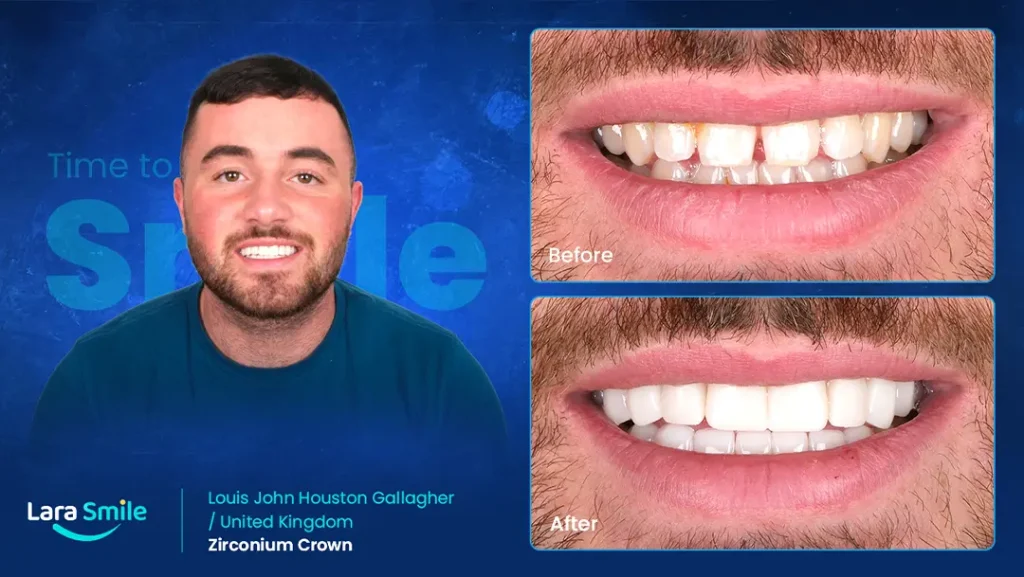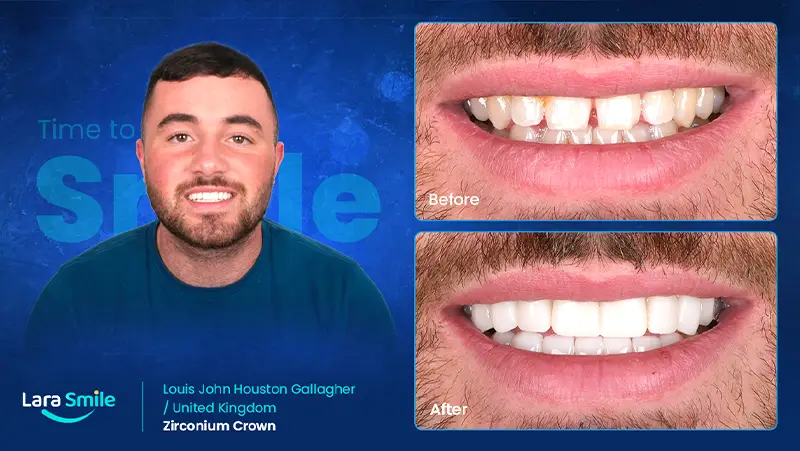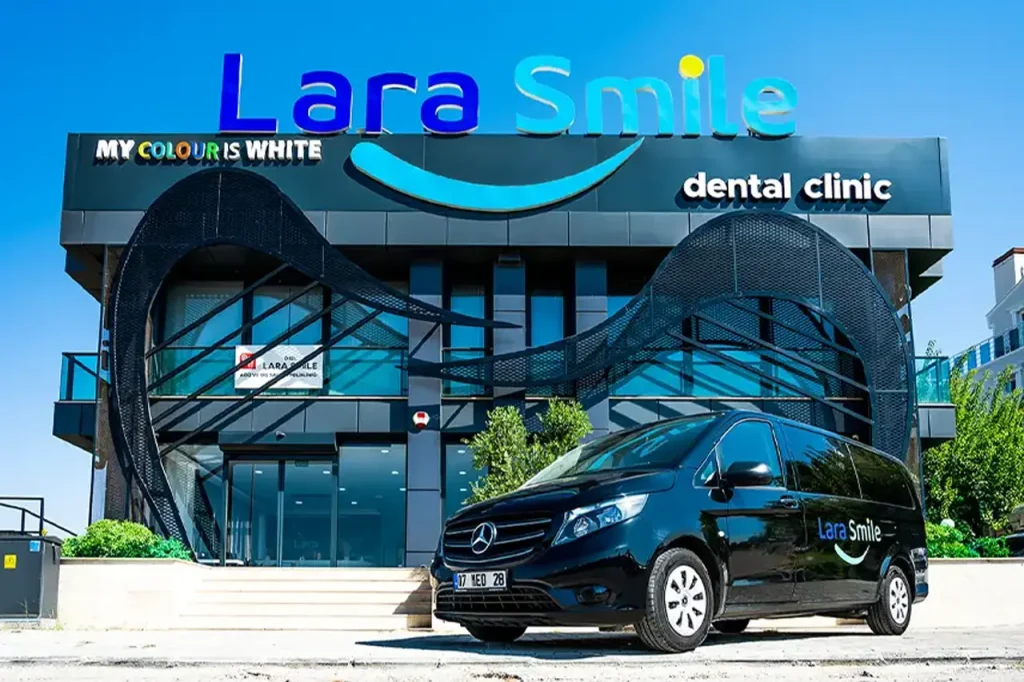If you live in the UK, you have probably heard the phrase “Turkey teeth”. It appears in newspapers, television documentaries, and viral social media posts, usually showing young people returning from Turkey with dazzling but sometimes problematic smiles.
This term has become a catch-all label for dental tourism in Turkey, often used with both fascination and concern. But what does it actually mean? Are patients genuinely at higher risk when travelling abroad for treatment, or is this a myth fuelled by sensational headlines?
This guide examines the reality behind “Turkey teeth”. We look at how the phrase emerged, the risks it implies, and what patients should understand before making decisions about dental treatment in Antalya.

What Does “Turkey Teeth” Really Mean?
How the Term Took Off
The earliest widespread use of “Turkey teeth” can be traced to the early 2020s, when British reality TV personalities and influencers began openly documenting their dental transformations in Turkey. Platforms like Instagram, TikTok, and YouTube amplified these stories. Short videos showed influencers boarding flights to Antalya or Istanbul, and returning with bright, uniform teeth within a week.
The tabloid press quickly seized on the phenomenon. Headlines focused on two aspects: the dramatic cosmetic effect and the affordable cost compared to UK treatment. However, many stories were framed in cautionary tones, suggesting that patients were sacrificing safety for speed and low prices. This combination of envy, fascination, and alarm made “Turkey teeth” a cultural talking point far beyond dentistry.
The Role of Media and Social Media
Social media and traditional media have both amplified the term “Turkey teeth.” Influencers often showcase dramatic before-and-after images that highlight the appeal of rapid transformations, while newspapers frame the trend with cautionary headlines that stress cost and potential risks. This creates a narrative that is both attractive and alarming.
What is often missing is balance and context. Treatment outcomes vary depending on the clinic, patient needs, and communication during planning. Without these details, media coverage fuels stereotypes rather than helping patients understand the importance of informed choice.
The Patient Journey: From the UK to Antalya
Research and Consultation
The journey usually begins online. Potential patients search for information about veneers, crowns, implants, or whitening, and soon encounter a mixture of glowing testimonials, sceptical reviews, and alarmist headlines about “Turkey teeth.” This initial stage is often the most confusing.
Reputable clinics in Antalya, such as Lara Smile, provide clear, accessible websites in English, German, and other European languages. Patients are advised to look for information on dentists’ qualifications, clinic accreditations, sterilisation protocols, and the materials used. At this point, it is also wise to check whether the clinic offers detailed consultations rather than pushing a one-size-fits-all solution.
Most international patients begin with a virtual consultation. This may involve sending photographs of their smile or panoramic X-rays to the clinic. Dentists then assess whether veneers, crowns, implants, or other treatments are suitable. Importantly, patients should expect a conversation about alternatives, risks, and expected outcomes, not just a treatment plan.
At Lara Smile, coordinators fluent in English, German, Dutch, and Nordic languages support patients at this stage, ensuring that no details are lost in translation. For many, this reassurance about communication is a deciding factor.
Travel and Arrival
Antalya is well connected, with direct flights from London, Manchester, Birmingham, Berlin, Amsterdam, and Scandinavian capitals. The flight takes roughly four hours from most UK airports. High-quality clinics usually help patients by arranging airport transfers and recommending partner hotels near the practice. This integrated approach means patients do not need to navigate logistics alone.
Upon arrival, patients typically attend their first in-person consultation. This appointment includes a full clinical examination, dental scans, and a detailed discussion about the treatment plan. Any changes from the virtual consultation can be explained here, and patients are asked to sign consent forms after their questions are answered.
For many, this is the moment when anxiety eases. Meeting the dental team face-to-face and seeing the clinic’s hygiene standards reassures patients that they are in safe hands.
Treatment and Aftercare
The treatment itself can take anywhere from three to ten days, depending on complexity. Veneer or crown treatments usually involve two to three visits: tooth preparation, trial fitting, and final placement. Implant surgery may require a staged approach, with healing periods between visits. Throughout, patients are guided by multilingual coordinators and are given aftercare instructions in writing.
Once treatment is completed, patients return home with detailed advice on oral hygiene, diet, and follow-up. Many clinics provide night guards for those receiving veneers or crowns, as grinding can damage restorations. Aftercare often includes online check-ins, allowing patients to report progress or raise concerns even after leaving Turkey.
Safety and Hygiene Standards in Antalya Clinics
One of the most common concerns voiced by patients considering treatment abroad is whether clinics in Turkey meet the same safety and hygiene standards as those in the UK or wider Europe. Media coverage of “Turkey teeth” often paints a picture of inconsistent regulation, suggesting that patients take unnecessary risks when travelling overseas. While there are certainly differences between providers, the reality is that many clinics in Antalya operate at — and often exceed — international standards of sterilisation, materials, and clinical governance.
Sterilisation and Infection Control
At the foundation of safe dentistry lies sterilisation. Every instrument used in the mouth carries a potential risk of transmitting infection if not properly cleaned. High-standard clinics in Antalya follow EU-compliant sterilisation protocols, using autoclaves (steam under pressure) to eliminate all microbial life.
At Lara Smile, instruments are tracked through sterilisation cycles, and disposable single-use items are employed wherever possible. Surfaces are disinfected between patients, and personal protective equipment (PPE) is mandatory for all staff. These practices mirror — and in some cases exceed — NHS guidelines.
Certified Materials and Technology
Another frequent concern is whether the veneers, crowns, or implants used in Turkey are of the same quality as those in the UK. Reputable clinics exclusively use CE and ISO-certified materials, meaning they meet European Union safety and manufacturing standards. This includes porcelain, zirconia, resin composites, and titanium implants sourced from recognised global brands.
Technology also plays a key role. Digital scanners, 3D imaging, and CAD/CAM milling machines are widely used in Antalya clinics, enabling precision and reducing the risk of human error. Such investments in modern equipment reflect the country’s growing reputation as a hub for international dental tourism.
Regulation and Professional Oversight
Dentists in Turkey are licensed under the Turkish Dental Association and must complete rigorous training before practice. Many also hold international certifications or memberships in organisations such as the European Association for Osseointegration (EAO). Patients should always feel comfortable asking about their dentist’s qualifications and experience — a transparent clinic will provide this information readily.
Communication and Informed Consent
Safety is not only about instruments and materials but also about clear communication. Misunderstandings about the difference between veneers and crowns, or about the shade and shape of teeth, can leave patients disappointed. Responsible clinics ensure that treatment options, risks, and alternatives are explained in detail before procedures begin. Consent forms should be provided in the patient’s own language, allowing for truly informed decision-making.
Multilingual Support
For international patients, the language barrier can be a source of anxiety. Many Antalya clinics, including Lara Smile, employ coordinators fluent in English, German, Dutch, and Nordic languages. This reduces the risk of miscommunication and helps patients feel supported throughout their journey.
Treatment Options and Their Risks
When people talk about “Turkey teeth,” they often imagine a single type of treatment: rows of bright white crowns fitted in record time. In reality, dentistry in Antalya — as in the UK — encompasses a wide range of options, from cosmetic enhancements to full restorative procedures. To make informed decisions, patients need to understand not only what each treatment involves, but also the risks, limitations, and realistic lifespan of the results.
Veneers vs Crowns vs Implants
Treatment | Description | Benefits | Risks | Limitations |
Veneers | Thin porcelain or composite shells bonded to the front of teeth, requiring minimal reshaping (0.3–0.7 mm). | • Preserve most of the natural tooth •Highly aesthetic •Less invasive than crowns | • May increase sensitivity •Can fracture under excessive force •Need replacement after 10–15 years | • Not suitable for severely damaged or decayed teeth •Colour cannot be changed after placement |
Crowns | Caps covering the entire visible portion of a tooth, often used for heavily filled or root canal-treated teeth. | • Provide strength and protection •10–20 year lifespan •Excellent aesthetics with modern ceramics | • Require significant reshaping •Unnecessary use on healthy teeth may compromise vitality | • If gums recede, edges may show •Irreversible once tooth is prepared |
Implants | Titanium posts placed in the jawbone to replace missing roots, supporting crowns, bridges, or dentures. | • Prevent bone loss • Long-lasting (15+ years) •Natural appearance and function | • Require surgery •Healing and bone integration can take months •Possible failure with poor hygiene | • Not suitable for patients with gum disease • Heavy smoking or certain medical conditions |
Whitening
- Benefits:
- Quick and non-invasive
- Relatively low risk
- Risks:
- Temporary sensitivity
- Uneven results if existing restorations are present
- Limitations:
- Not permanent
- Lifestyle factors (coffee, smoking) can reduce longevity

Realistic Outcomes and the Lara Smile Approach
The appeal of a transformed smile is powerful. Social media platforms overflow with glossy before-and-after photos, and the phrase “Turkey teeth” is often used to describe a sudden and dramatic change. Yet outcomes in dentistry are never uniform, and the greatest challenge for patients is separating myth from reality. Understanding what can realistically be achieved — and what cannot — is essential for anyone considering treatment in Antalya.
What Patients Can Expect in Reality
Patients who approach dental treatment responsibly, choose accredited clinics, and follow aftercare instructions can expect outcomes that are both natural and durable. Veneers and crowns typically last between 10 and 15 years, while implants can last much longer with proper care. However, these restorations are not permanent. Just as fillings or orthodontic work require maintenance, so too does cosmetic and restorative dentistry.
The best results are those that harmonise with the patient’s overall facial structure. A natural smile is usually more flattering and sustainable than an overly uniform set of ultra-white crowns. Patients should also expect to play an active role in maintaining their results, through regular hygiene visits, protective night guards, and good oral care at home.
The Lara Smile Approach
At Lara Smile, we recognise the weight of the “Turkey teeth” stereotype and aim to offer a different narrative: one built on safety, transparency, and individualised care. Our approach includes:
- Minimally invasive dentistry: Preserving natural tooth structure whenever possible.
- Evidence-based planning: Recommending crowns only when clinically justified and veneers where appropriate.
- Patient-centred communication: Providing multilingual support and ensuring that consent is fully informed.
- International standards: Using CE/ISO-certified materials and EU-level sterilisation protocols.
- Aftercare continuity: Offering online follow-ups and liaising with local dentists when necessary.
We encourage patients not to view dentistry as a quick makeover but as a long-term investment in health and confidence. This means being realistic about potential risks, accepting the need for maintenance, and focusing on outcomes that look and feel natural.
Reframing the Conversation
Ultimately, the “Turkey teeth” label does a disservice to patients and to the many skilled professionals working in Antalya. It reduces complex medical decisions to a stereotype and overlooks the genuine improvements in quality of life that responsible dentistry can bring. By reframing the conversation around realistic outcomes, patients can move past fear and sensationalism, and towards informed, confident choices.
At Lara Smile, our mission is to guide patients through that journey with clarity, compassion, and professional integrity. For us, it is not about “Turkey teeth” at all — it is about healthy, sustainable smiles that stand the test of time.
Durability and Longevity: With appropriate maintenance, implants can last a lifetime.
Why Lara Smile Clinic in Antalya?
At Lara Smile, we specialize in All on 6 restorations with an international reputation for precision and care.
Here’s what sets us apart:
- 20+ years of experience in implant dentistry
- Digital Smile Design and 3D guided surgery
- Certified implantologists and prosthodontists
- English, German, French, and Arabic support
- VIP airport transfers and hotel booking assistance
- Transparent, all-inclusive pricing
Our in-house lab ensures high-quality, customized restorations with no delays.

Choosing the Right Clinic in Turkey
Selecting a reputable clinic is crucial for a successful All on 6 treatment. Lara Smile, a well established dental clinic in Turkey, offers top-tier dental services with experienced professionals and state of the art technology. With a commitment to patient satisfaction and high quality care, Lara Smile provides personalized treatment plans to ensure optimal results for each patient. For those considering All on 6 dental implant in Turkey, Turkey remains an excellent option, offering a perfect blend of affordability, expertise, and quality care.
How to Prepare for Dental Travel in Turkey
- Online Consultation: Share dental photos and x-rays via email or WhatsApp
- Receive Your Quote: Personalized, fixed price treatment plan
- Book Your Trip: We assist with flights, hotel, and transfers
- Pack Smart: Include your medical history, travel insurance, and comfortable clothing
- Enjoy Your Time: Explore Antalya’s beaches, bazaars, and cafes during recovery
Frequently Asked Questions (FAQs)
It is a media term describing dental treatments abroad, often implying overly aggressive crown work. In reality, outcomes depend on clinic standards.
No. Veneers cover only the front surface, requiring minimal preparation, while crowns encase the entire tooth.
When carried out in accredited clinics using EU-standard materials, treatments are as safe as in the UK. The key is choosing the right provider.
Typically 10–15 years for veneers and 10–20 years for crowns, depending on oral hygiene and habits.
Responsible clinics offer remote aftercare and can coordinate with your local dentist if needed.
Often due to poor clinic choice, lack of clear communication, or unrealistic expectations.
